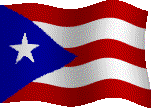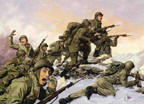 News From The Korean War
News From The Korean War

65th Infantry Regiment
January 25, 1953
Officer, 86 EM Convicted For Behavior In Battle
In addition, one other enlisted man still faces trial and four were acquitted of charges.
THE CHARGES ranged from misbehavior before the enemy to willful disobedience of orders.
The sentences ranged from 10 years to six months. Only one 10-year sentence was handed down,,,,,, Maj. Walton B. Mc, 3d Division public information officer said.
ALL Except two of those convicted received dishonorable discharges or bad conduct discharges. McMullen said. The remaining two will be allowed to take a discharge. The convicted men are currently being held in military stockades pending review in Washington of the court findings.
January 29, 1953
General Says 65th Fighting, Operating Despite Convictions
By PFC Jeremy Main
In a recorded interview brought back from division headquarters Smythe said that since the defection of men in the 65th, the regiment has "carried on its functions in a creditable manner."
Maj. Walter B. McMullen, public information officer for the 3d Division, related at a press conference the incidents near Jackson Heights around Oct. 28 and Nov. 3 which led to the court-martial of 92 enlisted men and one officer of the 65th Regiment.
McMULLEN said four of the enlisted men have been acquitted and a fifth is in a hospital awaiting trial.
Around Oct. 28, members of two 65th Regiment companies "disappeared" when enemy artillery opened fire. McMullen said. On Nov. 3, soldiers on a patrol returned to their lines without orders and without having met enemy opposition.
In the recorded interview, Smythe said it is "impossible to know " what went on in the minds of the men to cause the defection.
However, he declared, the 65th is eligible to go back in the lines in the future.
SMYTHE SAID the leaders of the regiment are "outstanding" and "above the average of officers in most divisions." The unit is "fully trained and equipped," he stated, and is "equal to and in many cases superior to " other regiments in Korea.
P.R. Given Chance To Defend Troops
He said when this is done the Army will "immediately" transmit the offer to the soldiers, most of whom are held in Japan and Korea.
February 18, 1953
Puerto Ricans Mark 53d Year As Outfit
With Army Forces
This unit became known as Puerto Rico Regiment, U.S. Volunteers, and later was designated the 65th Infantry Regiment, now serving with the 3d Division in Korea. For the past several months, the regiment, along with other 3d Division units, has been engaged in patrol actions along the Eighth Army front.
Col. Chester B. De Gavre, Redbank, N.J., now commands the regiment.
DURINF World War I the regiment helped man Panama Canal Zone defenses, and at the beginning of World War II was deployed in Puerto Rico and the Canal Zone.
After amphibious training at Port Aux Poules, North Africa, the Borinqueneers sailed to Europe where they took part in the Naples-Foggia, Rome-Arno, Central Europe, and Rhineland campaigns. The unit returned to Puerto Rico in November, 1945.
In September, 1950, the regiment landed in Korea to become one of the three regiments of the 3d Division.
THE 65TH Infantry Regiment was a part of "Task Force Dog," and served as a rear guard at the evacuation of Hungnam. Also , the Puerto Ricans took and held Chorwon in July, 1951, and was instrumental in breaking the Communists' "Iron Triangle."
Units of the 65th Infantry Regiment are made up of men from Puerto Rico, the Virgin Islands, and the continental United States.
The Borinqueneers received their name from the word "Borinquen," Indian name of their tropical island name.
Army Set To Assign Non-Puerto Ricans
As Replacements In Famed 65th Reg't
Puerto Rican soldiers henceforth will be assigned to the other regiments of Eighth Army in approximately the same proportion. However, the 65th Infantry Regiment will retain the numerical designation it has carried throughout two and one-half years of service in Korea, although it will no longer be a Puerto Rican regiment.
THE DEPARTMENT of the Army plans to return this regiment to Puerto Rico and reconstitute it as a Puerto Rican regiment upon completion of its service in Korea, AFFE said.
The adjustment will reduce the effect of the heavy rotation loss of trained leaders from the 65th and will make it possible for Eighth Army to achieve greater uniformity in the methods and the speed with which its units are trained, the AFFE news release pointed out.
The 65th Infantry Regiment arrived in the Far East Command in August, 1950, not long after the outbreak of the Korean war. The regiment initially was employed in the Pusan perimeter and in September of 1950 was assigned to the 3d Division which was without one of its original infantry regiments when it arrived in the theater that month.
The service of the 65th in combat in Korea has been marked by four Distinguished Service Crosses and 155 Silver Star medals among the well over 900 combat awards and Purple Hearts.
August 22, 1953
Reds Have Nothing, Say P.R. Ex-PWS
Trio Finds Communism Easy to Reject
By Ed Hymoff
The Puerto Rican soldier nodded emphatically to his two Spanish-speaking repatriated buddies.
They had seen the four horsemen - conquest, slaughter, famine, and death - race through prison Camp No. 1.
THEY HAD SEEN communism at work in the prison camp. They found it impossible to accept, simple to reject.
"Los Chinos," angrily explained PFC Moises Pevez Fuentes, 27, Puerta de Terra, P.R.. "They tell me China and Russia have everything and that the U.S. exploits Puerto Rico and I am exploited. So I say to them:
"I have a house and a car what have you got?"
The former 65th Regiment machinegunner then spat on the floor of the tent and added:
"THEY GIVE ME fast answer. They threw me in jail box. That's only answer they know when they cannot answer questions."
Three Puerto Ricans, captured when the then all-Puerto Rican 65th Regiment clashed with counterattacking Chinese armies in August and September, 1951, had definite ideas about communism when they reached freedom.
Their command of the English language was colored with heavy Spanish accents. But during their imprisonment the Reds could not color the patriotism of the three Spanish-speaking Americans.
ALL OF THE WORN Communist propaganda was used in vain. Tales of American "imperialism," "colonialism," "exploitation of the masses," and "Wall street capitalism" rang upon deaf ears.
M/Sgt. Enrique R. Fernandez, 31, San German, P.R., captured two years ago to the day when his platoon command post was overrun, could hardly pronounce the word "exploitation."
But he knew what exploitation meant. He had been exploited.
"They said we were exploited," he explained grimly. "but they exploited us. They pushed us up the hills to chop and pick up wood. Even when we were sick.
"And they burned the wood in their own barracks to keep themselves warm. We were cold. Many died from pneumonia. And they said America exploited Puerto Rico."
THE SANDY-HAIRED platoon leader, who lapsed into Spanish whenever Chinese intelligence officers questioned him, was sent to the camp for privates and corporals because the Reds thought he was a low-ranking soldier.
Short and stocky Cpl. Fernando Arroyo, Puerto Nuevo, shook his fist when he remembered how the Communists kicked him around in the camp.
"They tell me when I put down my carbine we are now friends," he bitterly recollected.
"THEIR OFFICERS tell me about big trouble and revolution in Puerto Rico because Americans exploit masses. I tell them I am American and they are liars.
"They tell me I have nothing in Puerto Rico. I laugh, they get mad. I tell them I have a good house, a pretty wife, and plenty of food. They yell at me and tell me I lie.
"One officer said I am a friend of the Chinese people because we suffer together from capitalism. I get tired of listening and I forget how to speak English, That was good. None of them speak Spanish."
THE 36-YEAR-OLD Regular Army soldier muttered something in Spanish about stupid Communists who are pigs. Then he swore at them.
Fuentes, speaking for his buddies added:
"We may come from Puerto Rico and speak a different language but the Communists could not take away from us one thing - we are Americans."
